Carolinas
and Florida
Travels to Florida:
July 14 to August 6 (Pictures
are thumbnails. Click on them for a larger view).
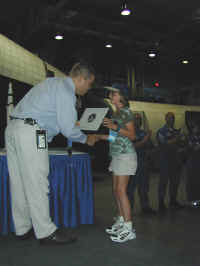
|
Shown in the picture to
the left is a highlight of the trip so far for Stephanie. Here she
receives her graduation certificate from Space Camp at the Kennedy Space Center
which she attended with her Mom over the last weekend. They had lots of
fun and learned a lot, using all the tools the astronauts use to get accustomed
to the Shuttle, space flight, high g's and no g's, and even 1/6 g's in case she
gets the chance to go back to the moon! See our update for more
information on her camp and the Kennedy Space Center.
|
This segment of our Odyssey
has taken us from Mount Vernon and Virginia Beach, VA southward down the
Atlantic and Gulf coasts of Virginia, the Carolinas, Georgia and Florida. Next
we're headed inland and north via the Appalachian mountains toward Canada.
In Virginia we visited
Mt. Vernon, the Virginia
Marine Science Center, and Norfolk. This area is where the French
naval fleet helped the US's revolutionary navy by preventing the British from being re-supplied,
thereby allowing General George Washington to soon claim defeat over Cornwallis
and the British at Yorktown without going through a major battle.
We continued on to Kitty Hawk, NC, the place where the Wright Brothers flew
the first airplane in 1903, and saw the beautiful, but becoming overbuilt, barrier
islands of North Carolina, and the marvelous, pristine national seashores. We
had a great stay in historic
Charleston, SC before proceeding to Florida for ten days where we've had many adventures,
both fun and educational.
Click on the link in the box above for updates including lots of new
pictures. The Trip
Log and Road
Maps (two maps this time) are
updated as well. Enjoy!
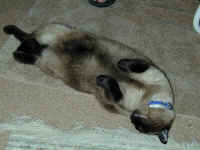
|
Sometimes, we feel like we
are getting a little stressed out with our trip. We are trying to do a
lot, including schooling, and it is fun, but does take a toll on each of us once
in a while. Our vet had alerted us to the stress the trip might have on
Java the Cat. Not to worry. He is seen here in one of his more normal poses in the middle of
the floor, asleep and
without a care in the world. We are glad we brought him...he gives us
perspective.
|
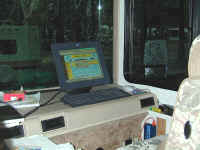
This is a picture of our
website being updated on our last update from Virginia Beach, VA. Our flat
panel computer screen is showing the progress of the update. Above and to the
left of the screen is our cellular phone hanging from the sun visor to
get the antenna vertical and thereby get the best signal. If you notice,
there is rain on the windows; there was a power failure, so we were using
our Inverter (running on the RV 12V batteries) to power the PC. This
update took over two hours to upload because of all the pictures (thumbnails and
full size), but it all went flawlessly--even with no power and no telephone land
lines! Isn't technology wonderful (When it works!)? Jennifer had
confidence in this, but now we've proven it!
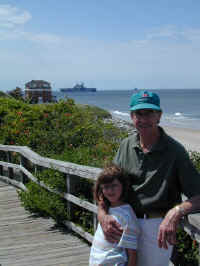
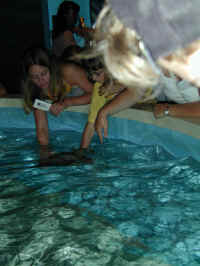
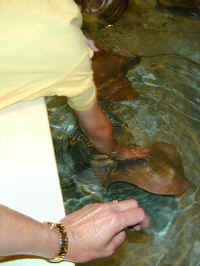
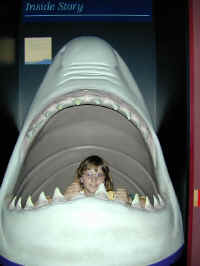
In the first
picture, Denny and Stephanie are enjoying the view from an overlook at Cape
Henry in Virginia Beach, VA. This is the site of the 'First Landing' of
the Jamestown settlers before they headed up the James River to form the first
British settlement in 1607. Also, in the waters here off Norfolk, the
French helped hold off the British from being supplied at Yorktown, thereby
contributing greatly to our eventual victory over the British in the
Revolutionary War. The next three pictures are at the Virginia Marine
Science Center. Stephanie is enjoying petting several small Sting Rays (no, they
don't sting you and behave much like cats by rubbing on you). Stephanie
shows what she would look like if a great white shark had swallowed her.
Fun, but avoiding the real thing is a better idea.
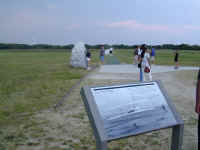
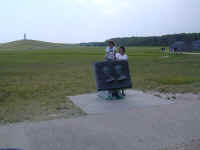
Here at Kitty Hawk, the
Wright Brothers flew the first airplane (or aeroplane, if you prefer) in
1903. They came here because the US Weather Bureau told them this was a
place with good winds, and gentle slopes and few trees -- perfect for gliders
and airplanes. The first picture shows the launch rail and the takeoff
point for the four flights made on that historic day. In the distance you
can see the markers showing the landing points. The last flight (Orville
and Wilbur alternated the flights) went almost to the trees in the
distance. Jennifer and Stephanie stand behind a memorial picture of the
Brothers and in the distance is the much larger official Wright Brothers
Memorial on the hill.
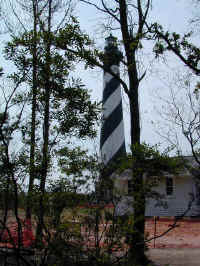
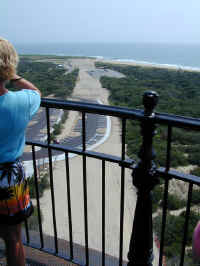
This is a picture of the
lighthouse on Hatteras Island on the outer banks in North Carolina. It is
the tallest lighthouse in the United States at 298 feet. The next picture
from the top shows the path the lighthouse took in 1999 when it was moved from
near the ocean (a position soon to be totally eroded) to its present position
well inland. This was quite a feat...pulled off with NO
problems.
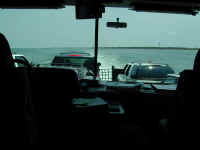
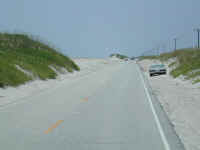
This is a picture out
our RV's (Betty) window from a ferry where we are crossing from Hatteras Island
to Ocracoke Island. It is a weird feeling to eat lunch in the RV while
traveling in a ferry on the ocean. The Outer Banks are beautiful barrier
islands tracing the North Carolina shoreline. This show shows the highway on Ocracoke Island with the ocean
on the left and a very short distance away to the right is Pamlico Sound,
separating the outer banks form the mainland.
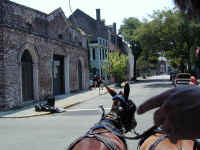
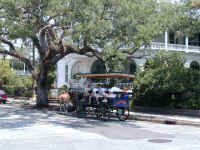
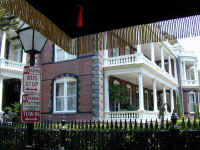
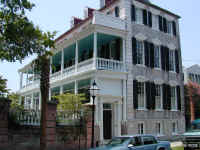
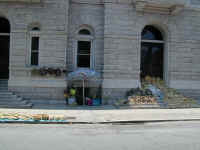
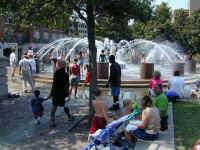
A few pictures here from
Charleston, SC where we took a carriage tour, drawn by donkeys (they withstand
the heat better than horses), around historic parts of the
city. The second picture shows a carriage stopped in front of some of the
nicer old homes from historic Charleston. The homes all had a side porch
or veranda, called a piazza locally. One of the
nicer local things you can buy is Sweet Grass baskets, here displayed on the steps
of a building. This is an art that came over from Africa with the
slaves. Each basket, made of pine needles, bullrush, sawgrass, and sweet
grass, takes many hours to complete and the number of people
that can still do the work is being passed on as an ancient "cottage
industry." The primary material, sweet grass grows in wetlands being
drained (probably for golf courses in this part of the world!) and is becoming
an endangered species, thereby raising the value of the
baskets. Lastly, a waterfront park with many kids in it trying to get away
from the heat!! We learned that before Hurricane Hugo hit Charleston a few
years ago, tourism was the 8th biggest industry...now, with redevelopment, it is
number 2.
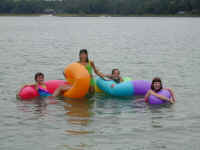
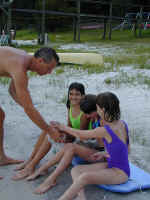
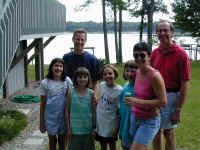
We spent a few great
days enjoying our friends, the Kings, who used to live in our neighborhood in
Englewood and now live in Gainesville, FL. They have a house on a lake
near Melrose, FL, which is where we parked our RV (including a full
hookup!). Stephanie enjoys a good time on the lake with their three
daughters (Katherine, Ashlyn and Kristy). Steph was introduced to a
Southern tradition: boiled peanuts. Finally, the King family,
including parents John and Candace, along with Denny and Stephanie.
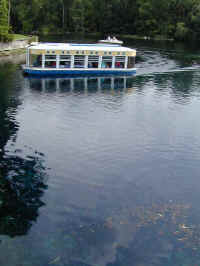
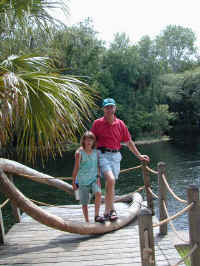
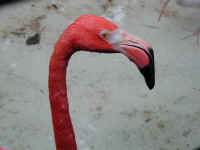
Silver Springs is a city
and park near the King's home. The first picture shows a glass bottom boat
over the largest spring. All of this water just emerges from the Florida
aquifer at
this spot and creates a substantial clear, clean river with large rate of flow. The park
has other attractions, including a zoo showing a number of exotic animals
including this Flamingo. Denny and Stephanie are getting their picture
taken on the bent palm which is supposed to bring 5 years of good luck...we
really are only asking for one, which would be for a safe and educational trip
on our Odyssey.
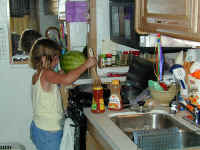
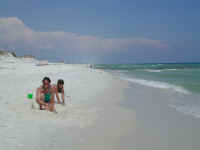
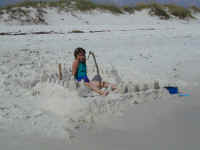
A trip across the state
to the panhandle of Florida and Navarre Beach took a long time but was well
worth it. Stephanie
prepares our taco dinner at our campsite in Navarre Beach. Jennifer
and Stephanie build a sand castle on Santa Rosa Island, which is part of the
Gulf Islands National Seashore, a beautiful place with really great, perfectly white (and
we mean white!) quartz sand beaches. Stephanie is guarding her castle against the
oncoming tide. The
tide won.
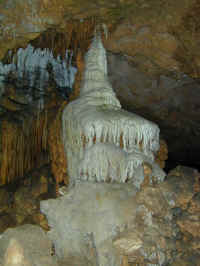
On the way back across
the state to St. Augustine, just south of Jacksonville, we made a quick detour
to visit the Florida Caverns State Park. We learned that all of the
Florida State Parks have been named best in the US. This is a picture
showing the 'wedding cake' stalactite / stalagmite flowstone formation. Many people
get married here or in other equally interesting parts of the cave. (Different
strokes...). The Civilian Conservation Corps (CCC) enhanced the Florida Caverns
during the Depression to make it into a viable tourist
attraction.
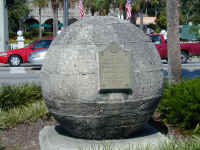
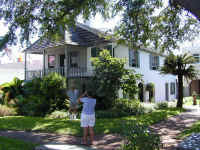
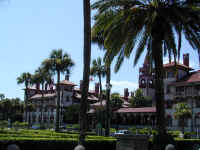
Here are a couple of
shots from St. Augustine, the oldest city in the US. It was discovered in
1513 and
settled by the Spanish in the early year of 1565, well before the British
Jamestown settlement in 1607. The first picture shows the start of the
Spanish Trail, a link between the Spanish missions which they say begins here and ends in San Diego, CA. The
next picture shows The Oldest House in the oldest city. Finally,
modern settlement and development of the east coast of Florida was due primarily
to a railroad man named Henry Flagler who built the railroad which ran down the
entire east coast and developed many resort hotels along the way. This fabulous turn-of-the-century hotel in St. Augustine
is now Flagler
College.
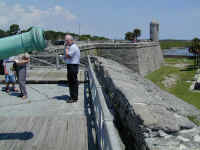
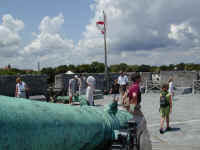
Also in St. Augustine is
a famous fort, built here by the Spanish, the Castillo de San
Marcos. The fort was involved in battles and a long siege but was never overrun. It
did change hands via treaty from the Spanish to the British, back to the Spanish
and then to the
Americans. The walls are very thick and are surrounded by a moat, which
you can see is grass in the first picture. Jennifer and Stephanie study the top
of the Fort and some of the numerous cannon. The Florida State flag takes
its design from
the historic Spanish Flag flying in the background. We've learned more about
16th Century artillery than we had thought possible.
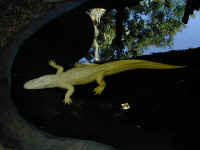
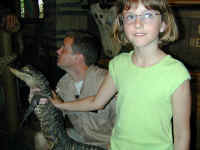
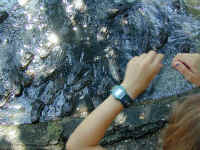
The Alligator Farm in
St. Augustine has examples of all the Crocodilia in the world, including lots
and lots of American Alligators. Here you can see an albino American
Alligator, bred from a wild specimen, which is popular with the tourists but
which would probably be eaten in the
wild because it is so easy to see. The only other Alligator specie is the Chinese Alligator which is very small (1 to 2 feet in
length). The other 30-odd species are crocodiles. Stephanie enjoyed the presentation on
alligators; here she is
'petting' George. He has his mouth taped shut with Scotch Tape.
Finally, Stephanie is feeding the hoards of alligators that they have at the
Farm...they certainly are not an endangered species!
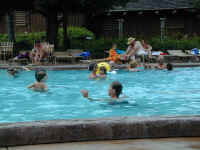
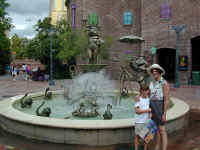
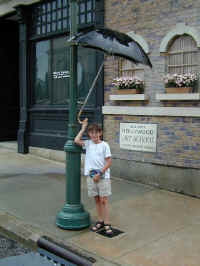
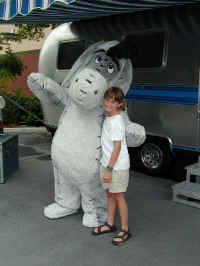
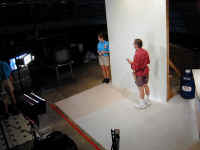
No trip to Florida's
mid-section could be complete with a trip to Disney World, with its four theme
parks (we skipped the Magic Kingdom, having seen Disneyland in California too
many times), Fort Wilderness, the fabulous RV park where we stayed, (we see
Jennifer and Stephanie swimming in their pool) and the numerous water and golf parks. We had a great time overall, but, by the end were
tired of
theme parks in general. Disney/MGM Studios is a combination of education on the
movie industry and theme thrill rides with the Disney stamp of creativity. Stephanie's favorite ride, the Tower of
Terror was a spooky Twilight Zone theme featuring a haunted '30s hotel,
holograms and falling elevator.
Very well done. Stephanie and Jennifer paid homage to Miss Piggy in front of her great fountain. Next, Stephanie tries
her hand singing in the rain with a fixed umbrella. An obligatory pose with a theme park animal...in this
case, Eeyore. Finally, Dennis tries his hand at acting on the set of Home
Improvement. He played the part of Al in a contest with Tim Allen to nail up
some dry wall. Dennis (er...Al) won the contest! If you look closely
you'll see Tim on the monitor on the left. What the audience saw was the
completed scene, of course.
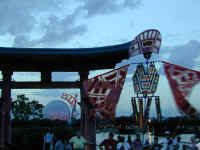
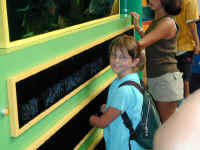
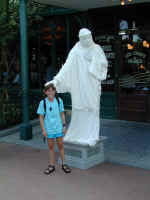
EPCOT (which stands for
Experimental Prototype Community of Tomorrow) is a lot of fun with its World
Fair flavor and exhibits from many of the countries of the world. There
are many parades (this one emphasizing time and cooperation by all the countries
of the world may look familiar for those who saw the Super Bowl halftime show) and
a spectacular evening pyrotechnics show, which we won't show you.
Stephanie tries her luck in 'feeling' items behind the black screen, much like a
blind person would. She also is patted by a white 'statue' in
France. The statue would assume many poses (a mime) and you would
swear it was a real plaster permanent statue.
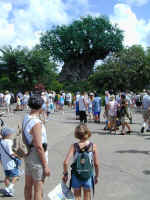
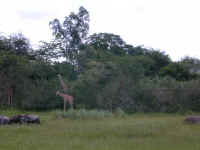
The newest park is
Animal Kingdom, a park with themes based on African and Asian countries and their animals. Here is
the Tree of Life, a Disney created tree with about 300
animals carved in the stone trunk. The highlight of the park is the
African Safari which puts you on real Safari trucks and takes you through the
back country bush. Our guide was from Botswana (really) and gave the tour
much atmosphere. Here we see some giraffes and other prairie animals.
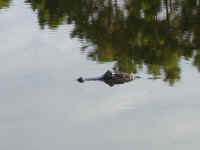
We then proceeded to
Titusville and the Kennedy Space Center where Jennifer and Stephanie attended Parent/Child Space
Camp. We've learned lots about Florida and alligators which
really are around everywhere. The little alligator (maybe 7 feet)
shown above lived in the golf course pond right behind our RV campsite. He
didn't do much other than eat a few fish now and then, but we did not let Java
the Cat out of the RV! Java is rather chunky at the moment and probably
would have looked like a tasty treat.
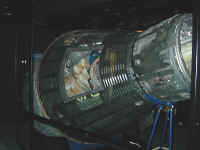
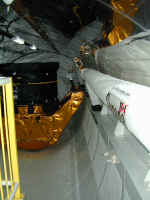
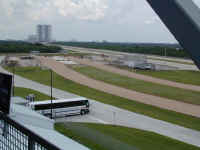
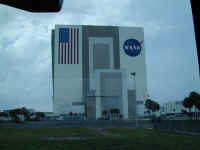
Here are a few shots of the Kennedy Space Center. The tour and the exhibits
are worth at least a day if you are in Florida...it is only 40 miles east of
Orlando. The first picture shows the Mercury Liberty Bell 7, the recently
recovered capsule that was lost when the hatch blew prematurely when Gus Grissom
had just splashed down. Later, Gus was one of the three astronauts killed
in the fire during a pre-test of Apollo I. He is termed the "Astronaut's
Astronaut" and is revered as a hero. The second shot is of the cargo
area of a Space Shuttle. It is a BIG area. The arm that moves things
in and out is shown and comes from Canada. The next shot shows the Vehicle
Assembly Building (VAB) in the background and the track where the Shuttle is
moved to the launch pads.. at the high speed of 1 MPH. This is the same
building used for the Apollo missions, so it is definitely large enough,
considering the Saturn V was twice the height of one Shuttle. The last shot of
the VAB, from 2-3 miles away, will give you perspective on its scale: look for the normal sized
pedestrian doors in the lower left, the palms are probably 30-40 ft. high, and each star is
6 ft. across!
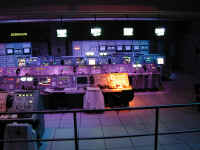
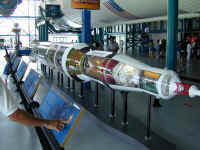
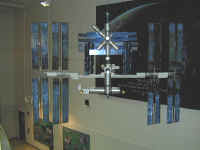
The next shot is of the
control room that ran the Apollo Missions to the Moon. It is set up
exactly the way it was in 1969 for the launch of the Apollo XI mission which
landed us on the moon. If you look at the second row to the right, you can
see some IBM coats on the chairs. Among other things, IBM was responsible
for the computers on board the spacecraft. A great model of the Saturn V
complex is shown with the real thing overhead. It is unbelievably HUGE,
especially when seen lying on its side inside a building. Finally, this model of
the International Space Station illustrates what we saw being assembled in the
adjacent clean rooms. The Space Station will keep the Shuttle very busy
for the next three years getting equipment into orbit for its construction; the target is
a minimum of eight missions a year.
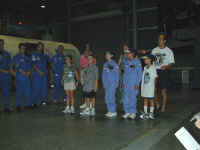
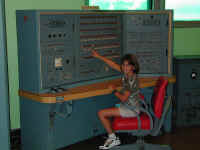
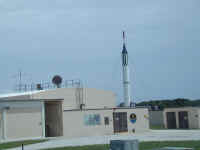
This picture shows the
team that Stephanie and Jennifer were on while at Space Camp. It was a
super opportunity to work as a team, learn about the space programs and
participate in real astronaut training. After two Shuttle Missions, first as
Payload Specialists, then as Extra-Vehicular Activities Specialist and Flight
Director, they're feeling pretty capable for the next step...Mars! Jennifer
prefers Mission Control work, and Steph the Orbiter assignments (weightless, of
course!!), but as a team they're unbeatable. Stephanie
did not opt for the flight suit and, instead, got sweats, a t-shirt and a flight
bag. We took an additional tour of Cape Canaveral which is the site for the
launches from the early Mercury and Gemini programs. Here, Stephanie works
the control board, made by Burroughs (remember them?). This would be
controlling things like the Redstone Rocket shown next with the Mercury Capsule
on it. This was also the place where Alan Shepard became America's first man in
space with his sub-orbital flight. (And we know the folklore now!)
Florida and the Atlantic
Coast have been very good to us, but it's now time to begin our northward trek.
We're off to Cumberland Island National Seashore in Georgia, the Okefenokee
Swamp National Wildlife Area and then to follow portions of the Appalachian
Trail (by RV, of course) through western NC, VA, MD and PA. Labor Day should
find us back in the Northeast ready to begin our tour of Canada. Wish us luck!

























































